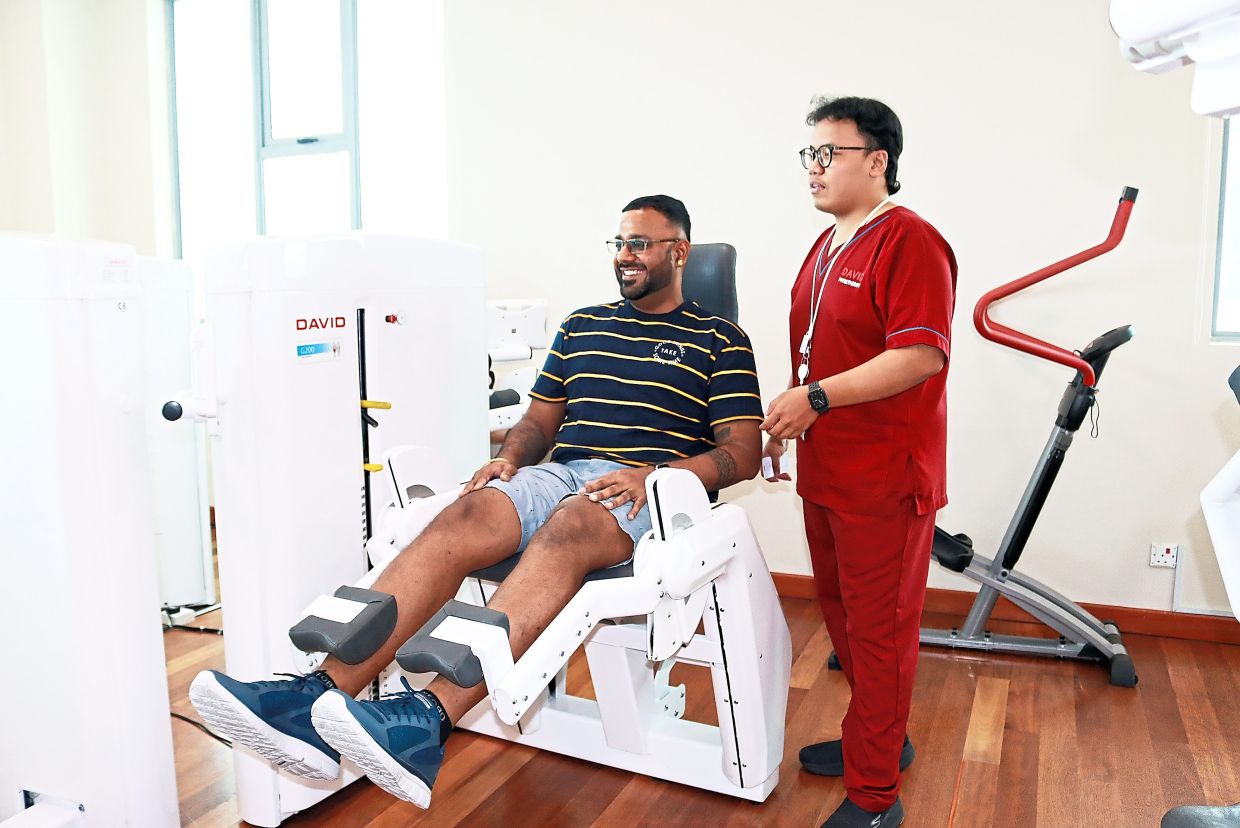A medically-supervised programme with culturally-sensitive dietary guidance, supervised exercise, appropriate drugs and emotional support can be of great help to obese patients. — HASSAN BAHRI/The Star
Many people are probably aware that Malaysia has a big obesity problem, with more than half of Malaysian adults being either overweight or obese.
On top of that, over half a million (2.5%) of these adults also have three other non-communicable diseases, i.e. diabetes, high blood pressure and high cholesterol levels.
An additional 4.5% of Malaysian adults have two out of those three diseases, besides being obese, according to the 2023 National Health and Morbidity Survey (NHMS).
What’s more worrying is that many of these people are unaware they have such illnesses.
The 2023 NHMS reports that 40% of those with diabetes, 41% of those with high blood pressure and 50% of those with high cholesterol do not even know that they have those conditions.
While losing weight is often a way to help manage all four of these diseases, having other concurrent chronic conditions can have a serious effect on such efforts.
Consultant internal medicine physician Dr Nurul Nadiah Mohd Iqbal explains that undiagnosed health conditions can often sabotage weight loss efforts.
“While lifestyle factors are important, obesity can also have medical causes, such as genetic conditions, enzyme deficiencies or certain medications,” she says.
“Psychiatric drugs, anti-convulsants and some anti-diabetic medicines like insulin may not directly cause obesity, but can increase appetite or alter eating behaviours.”
This is why having a medically-supervised weight-loss programme can be a good idea.
A multipronged approach
“When patients attempt drastic changes without first understanding their health baseline, they can do more harm than good,” Dr Nadiah explains.
“That is why supervised weight management, which considers each patient’s medical profile, nutritional needs and physical condition, is essential for safe and sustainable results.”
For obese individuals, treatment typically begins with lifestyle and nutritional interventions, followed by tailored physical activity guided by a physiotherapist.
They should ideally start off with clinical assessments that include measurements of body mass index (BMI), waist and abdominal circumference, vital signs such as blood pressure and heart rate, and body composition analysis.
The health of their heart, liver and kidneys are also evaluated.
Blood investigations may include tests for blood glucose (sugar), blood cholesterol, electrolytes, liver and kidney function, as well as a full blood count.
Consultant internal medicine physician Dr Tamilvani Arumugam notes that: “Every patient’s journey is different.
“Some people lose weight, only to gain it back later.
“That’s why we developed this comprehensive obesity management programme, to provide a structured, guided approach that patients can follow for longer and truly benefit from.”
She adds that medical supervision plays a key role in reducing dropout rates, as ongoing follow- ups help patients sustain their efforts and address setbacks early.
Behavioural therapy also remains crucial, supporting patients in monitoring food intake, weight and activity levels while helping them set realistic goals.
A pharmaceutical push
The advent of effective anti-obesity medications has resulted in such drugs being included into the programme.
Says Dr Tamilvani: “Today, we have safer and more effective medicines than before, which is why we’ve incorporated them into our programme.
“When medications are involved, they must be closely monitored to ensure effectiveness and to avoid side effects like fatigue, dehydration or nutrient imbalances.”
While she notes that there are common myths about weight-loss drugs – e.g. that they are only for people who are “too lazy” to exercise – the reality is that obesity is a complex disease influenced by many internal and external factors.
These medications work by helping to regulate internal factors such as appetite, metabolism and brain signals, she explains.
“Another misconception is that weight lost with medication will stay off permanently after stopping the drug,” she says.
“The truth is, sustainable weight loss still depends on maintaining healthy habits after treatment.”
ALSO READ: Weight rebounds quickly after stopping anti-obesity jabs
While such medications can be costly, it may reduce future healthcare expenses by lowering the risk of conditions such as diabetes and heart disease.
The drug dosage is typically tailored to the patient and reviewed every one to three months, with adjustments made based on blood pressure, glucose levels, lab results and symptoms.
Patients are closely monitored for side effects such as fatigue, dizziness or low blood glucose.
Balancing culture and nutrition
With food being central to Malaysian social life, controlling one’s diet can often prove very difficult.
“Food is cultural and emotional,” says Bukit Tinggi Medical Centre senior dietitian Rama Parahakaran.
“Rather than imposing strict or unfamiliar diets, we work with what patients already know and love.”
Cultural sustainability in nutrition means respecting traditional food practices while promoting balanced eating.
This begins with identifying a person’s cultural eating habits, then creating a balanced meal plan that honours those traditions while supporting overall well-being.
ALSO READ: Region-specific diets around China recommended to combat obesity
The goal is not to remove favourite dishes, but to adapt them.
For example, instead of forbidding nasi lemak, the white rice cooked in coconut milk could be replaced with brown rice or a low-fat milk version.
Meats can be grilled, roasted or air-fried, instead of deep-fried.
“Cooking methods matter,” Rama stresses.
“Frequent frying, heavy coconut milk use or oversized portions can reduce a meal’s nutritional value.”
AI support for exercise
Physical activity is a crucial element in weight management, but only when done safely.
“Many patients with obesity have knee pain, poor posture or balance issues,” notes Bukit Tinggi Medical Centre physiotherapist Kiran Kaur.
Now, physiotherapists can take advantage of artificial intelligence (AI) programmes to help them assess and monitor patients, as well as tailor individualised exercise regimes.
“Electromechanical rehabilitation devices support weight loss by activating and strengthening muscles through AI-personalised plans – just like how doctors prescribe medication or dietitians create meal plans,” Kiran shares.
The AI is integrated with regular exercise equipment and is designed to prioritise safety.
It is also interactive, adjusting resistance by small increments (such as 2.1 or 2.5 kg) based on user feedback.
This also enables patient progress to be tracked with measurable data, with Kiran sharing that and many patients reach optimal mobility, strength and balance after around 24 sessions.
With the right help
Bukit Tinggi Medical Centre physiotherapist K. Karthikeyen is one person who is familiar with the difficulties of losing weight.
The 37-year-old shares that he used to work out a few years ago, but still found it hard to lose even a few kilos.
In addition, he had unstable high blood pressure, as well as back pain.
“Even with medication before this programme, my doctor had to keep increasing the dosage because my blood pressure remained unstable, likely due to lifestyle factors and wedding- related stress,” he shares.
“Once my wedding was over, I decided to make a change.”
Weighing 120kg, Karthikeyen’s weight-loss programme included daily injections, a tailored exercise regime and a diet plan.
In three months, he lost 14-15 kg, yet maintained enough energy for his physically-demanding job despite a calorie deficit, and even managed to reduce his blood pressure medication.
Now weighing around 105kg, he is being monitored to see if he can stop the blood pressure medication entirely.
“That has been my biggest success, along with the improvement in my body weight and shape,” he shares.
He adds: “Before my wedding, I tried losing weight on my own, but I kept slipping back.
“Once I got proper guidance from the doctors, the dietitian and physiotherapy, it all made sense.
“I’m still on the journey, but this time I’m doing it right.”
As Dr Nadiah notes: “Obesity care is not about willpower alone.
“It is about structure, science and steady support.”







